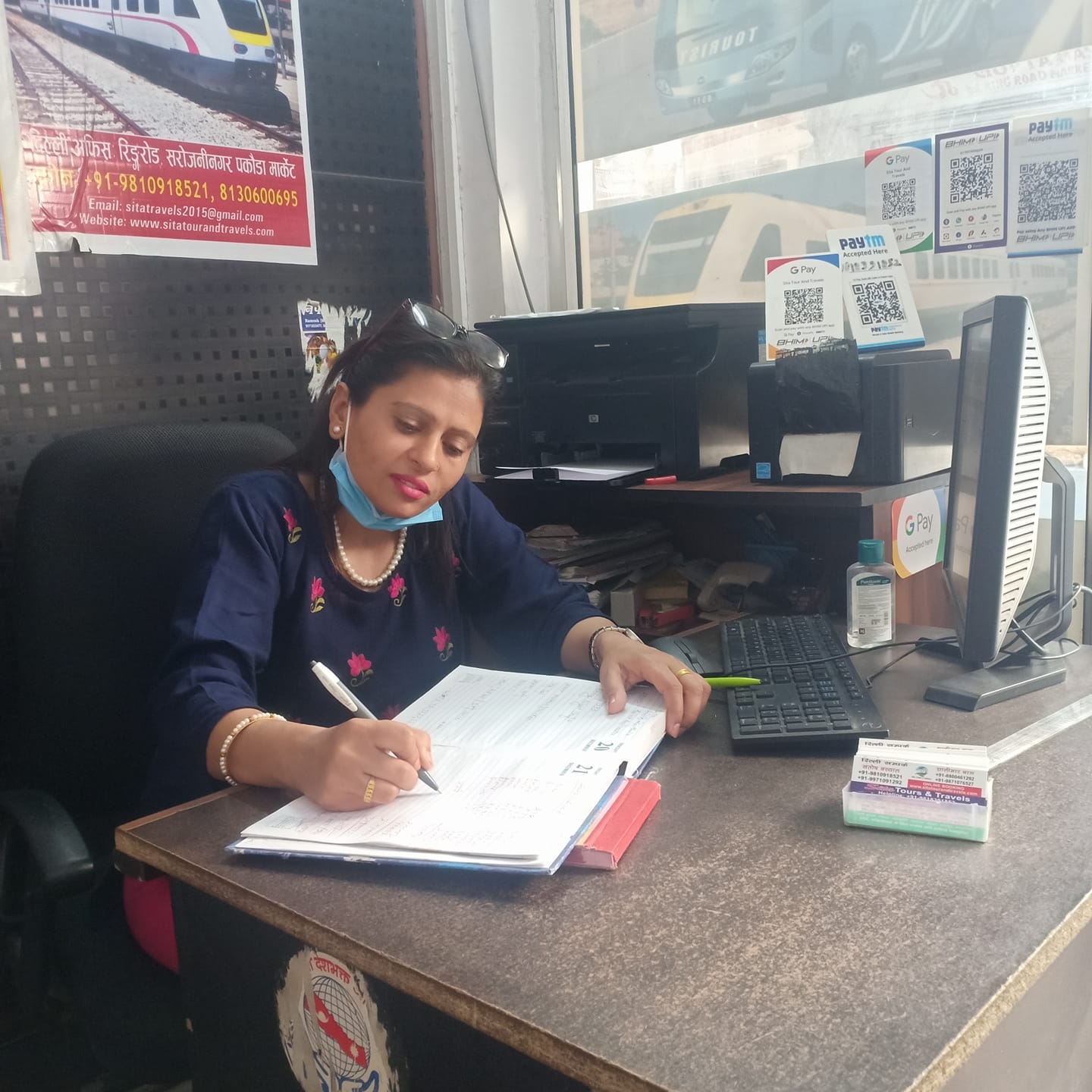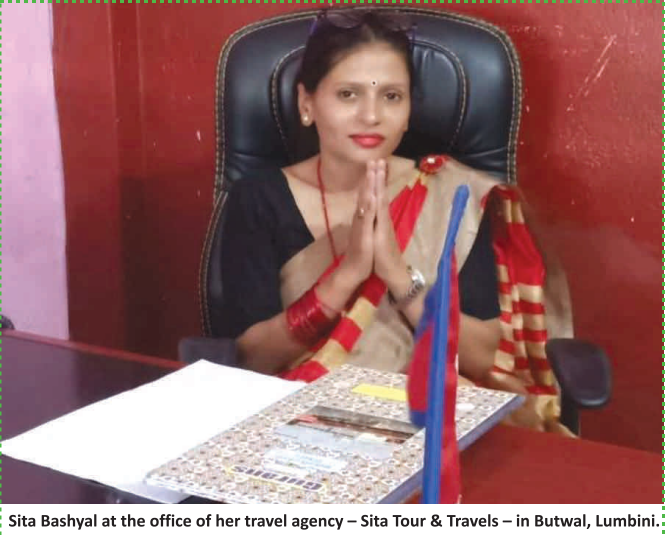A former migrant worker turned travel entrepreneur has her heart set on helping Returnee Migrants Workers
Sita finds her calling working for returnee migrants
June 7, 2022

Butwal: When COVID-19 pandemic struck the world and Nepal went on a protracted lockdown from March 2020 onwards, Sita Bashyal from Devdaha Municipality in the province of Lumbini, the birth-place of historical Buddha, immediately felt the heat. The company she started - Sita Tour and Travels – with its airline ticketing service and four inter-country buses of its own had to immediately cut down operations: from daily Kathmandu to New Delhi bus service to none at all, though later resuming the route in fits and starts.
Yet it was the plight of fellow returnee migrant workers (RMWs), and especially those who were forced to fly back home after losing their jobs abroad or were on unpaid leave owing to the pandemic, that took Sita’s sleep away more than her temporarily closed travel business, which she was certain would pick up once the virus would stop infecting and making people sick so severely.
During the pandemic, Sita started actively volunteering her spare time to Returnee Migrant Nepal (RMN), a loose network of RMWs across the country working for the welfare of returnee migrants. As RMN initiated various programs for the overall benefit of returnee migrants in Nepal, including workplace-based learning and earning program where many RMWs received skills training in goat and mushroom farming in with the help of UNDP’s SKILLS Programme, Sita too was involved in a rapid survey of RMWs’ existing skills and future training needs in the Madhesh and Lumbini Provinces, resulting in collection of data of more than 800 RMWs. This exercise was also supposed to inform the government programme aimed at providing collateral-free, easy loans to RMWs for encouraging them towards self-employment or entrepreneurship.
Sita’s empathy towards returnee workers, however, stemmed not only from humanitarian and altruistic grounds, but also due to her own past as a RMW as well as a long family history of working abroad that led her further afield. She had started her travel company after returning home from Dubai where she had worked tirelessly for nine years, first as a house maid then changing job to become a salesgirl and reaching to the position of cashier at a supermarket.
“Like millions of Nepali people, I went abroad for foreign employment purely due to financial reasons, so as to be able to provide a decent education for my children and uplift my family’s living standards, ” Sita says, remembering that she had to leave her kids to the care of her husband who was miffed at her for opting to go to Dubai against his wishes. She believes that Nepali society as whole still looks down upon women who have returned from abroad, mainly from the middle-eastern countries rather than Europe or America, and this perception has still not changed because of which many suffer discrimination and stigma.

Struggling with unemployment and limited opportunities in Nepal, Sita said there was one more reason behind her decision to opt for the path of foreign employment after finishing her SLC, or Grade 10 finals.
“It was because of my sheer desire not to depend financially on my husband, father nor any of my brothers that I went abroad to earn some money for me and my family,” she reveals while recounting that her own mother had gone abroad pretty much due to the same reasons and upon returning to Nepal, led a weekly clean-up campaign in her hometown and nearby villages influenced by the neat and clean roads and places she had seen while working abroad.
It was while working as a marketing personnel at a travel agency in Dubai that Sita learned the importance of top-quality customer service. Besides that, Sita started interacting in English and middle-eastern languages, learned about self-discipline, the importance of time and above all respect for hard-work no matter what kind of work it is, something unimaginable in Nepal where she thinks people still look down upon people involved in what is deemed to be low-status work.
Sita’s years of hard-work paid off eventually when she was finally able to pay off the debt taken to build a house for her family. In the meantime, she had managed to finance a decent education for her three children, buy an additional housing plot and had saved enough money to invest in a business of her liking.
“Even while working abroad, I knew that travel and tour business had great prospects considering the booming tourism industry in Kathmandu, Lumbini and other scenic places. Therefore, I started the travel company with a partner who had also returned from abroad and employed six more returnee migrants like us as drivers, ticketing officers and helpers,” Sita reminisces. Later, as her business started to grow, she even asked her two younger brothers – one working in United Arab Emirates and another studying in United Kingdom – to return home and help her manage the flourishing business.
All said and done, it is still her work as a provincial coordinator of RMN through which she is leading a campaign to collect data and information of RMWs in Lumbini Province that she derives her utmost satisfaction. For Sita shoulders an important responsibility which will help identify potential RMWs who will participate in skill training, certification and post-training career counselling to them so as to reintegrate them in the local job market and economy.
“I have collected data and information of more than 600 RMWs who are keen to participate in this program and do something useful in their own country. They are also happy they will be able to utilize some of the skills they had learned abroad by participating in this skilling program in agriculture, construction and tourism sector,” Sita informs, adding that even though some of those employed as a security guard or a driver abroad won’t be able to learn similar skills by participating in this program, they would still be better off than RMWs like her who were confused, devoid of any help, had to do all on their own in the past.
“At least they will be grateful that they now have something to fall back on thanks to this skilling and certification program. It gives me great pleasure to say that the returnee migrants are happy and looking forward to participating in it.”
UNDP SKILLS is implementing ‘The Enhancing Returnee Migrant Workers Skills (RMWs) for Employment’ project which aims to deliver skills training, certification and equipment support/post-training career counselling to 1500 RMWs in Lumbini and Madhesh Provinces. The project is implemented by the Federal Ministry of Education, Science and Technology (MoEST) with the support of British Council managed Dakchyata Project and funding by European Union in Nepal.

 Locations
Locations


